Having been reading about Portugal, I tried this title.
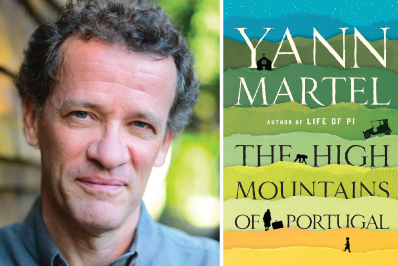
It opens with a nice walk through 1903 Lisbon. I followed some of it on Google maps.
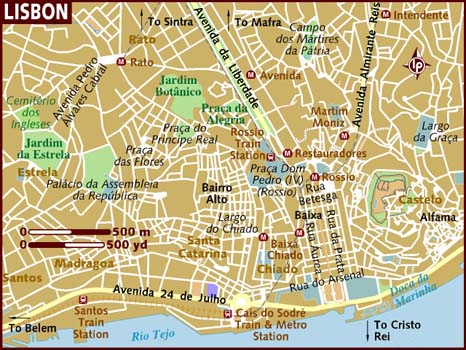
However this book is SO contrived. Our protagonist walks through the city backward, yes like a defensive safety or like Ginger Rodgers! He is sad and in mourning and expresses it in this way and has been doing this for a year or more. Oh hum. Thus making others responsible for not colliding with him. How egotistical. Out of my way! Coming through, backward! Yes I know walking backward can be a form of contrition but there is none of the spiritual depth of that implied in these pages, where it reads like what it is, a gimmick.
The backward walker reaches his rich uncle’s house and uncle is a lively character who wants to move with the times, in particular with the automobile. Many pages are consumed as the uncle tries to explain to the protagonist how to drive. He makes no effort to learn but some how does manage to do it. Backward, indeed.
He then drives off to the high mountains on a quest. To find an altar piece carved in Angola and which is in a little out-of-the-way church there. He read about the altar piece in a priest’s diary from the 16th century, which no one else has read, it having been buried in an uncatalogued box in the national archives, and then traced it through shipping, archival, and ecclesiastical records. That part was interesting but sped through.
Nothing compelling here. He manages to drive the car through villages to the amazement of locals and the boredom of this reader. It is a short book so I will flip more, but…
I did keep flipping. It is three stories connected only by the author’s assertion that they connect. After the motorist who does find the altar piece, which portrays Jesus on the cross as an ape. Better if it were an African slave after the harrowing descriptions of that.
Then a doctor and his wife in 1938 without any reference to the Salazar regime or the wider world that I noted in my FF, Fast Flipping.
Then in the 1980s a Canadian senator who retires there. Odd that. The author does seem to know anything about the Canadian Senate which is largely ceremonial. While the senator’s ancestors were Portuguese he hasn’t the language but moves there anyway in retirement with his recently acquired pet ape. Yep! The first scene of recognition with Odo, the ape, is very good, but then it is repeated with dogs, with birds, Odo can relate to anything.
Once again it seems to me that all this creativity is to impress other writers, awards panel members, and jaded reviewers and not to entertain, educate, or stimulate readers. Moreover, most of it seems to have been researched in manuals and reads like it, the car, the mountains, the apes; it reads like digests from Wikipedia interspersed with some dialogue and a few quite good scenes.
Even more depressing than reading the book is reading the high praise heaped on it by professional reviewers.
Author: Michael W Jackson
Morgue Drawer Four: Clink or Cooler? (2013) by Jutta Profijt
Pascha the unwanted ghost is still about, annoying the only human that he can contact, Dr Martin; the Goose, as Pascha calls him. Martin has taken extreme measures to control, if not rid himself, of this apparition by installing all manner of electronic gear in his home, offering feeble explanations to his long suffering girl friend about why he has an electronic net over the bed. Martin goes to endless lengths to conceal the fact that he is haunted by Pascha, though his one and only friend Gregor knows. Gregor is a man who can keep a secret.
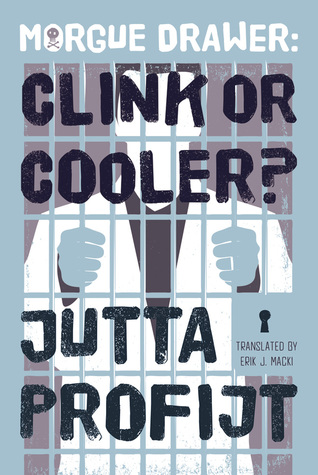
Gregor is Herr Detective Inspector Kreidler whom Pascha rather grudgingly admires. Gregor is an action man and that appeals to Pascha, the one time car thief.
But then then two police officers appear with a warrant and arrest Gregor, who lapses into an uncharacteristic passivity. Pascha is outraged and is determined to spring him.

He needs Martin for that but Martin is completely preoccupied with his girlfriend who is pregnant. Martin spends hours supervising her, arranging her diet, instructing her in exercises, telling her when and how to sleep, to rest by sitting such-and-such a posture. Martin is a health fanatic and this he imposes on her, well, he tries to do so but Brigit has a mind of own and the appetite of more than two. She may eat as he asserts when he is there but when he is not let the chocolate cookies, fruit bars, potato chips, anything and everything roll.
The only way Pascha can mobilize Martin is by claiming to be in contact with the soon to be born child. A lie but Pascha is a much-practised liar.
For her part Brigit is bored by Martin’s Regime and she wants to help Gregor, not sit quietly inn a dark room listening to soporific music eating lettuce leaves for six more months. (By the way, this sounds pretty much Martin’s idea of heaven.)

Martin, of course, does too but not at the expense of leaving Brigit’s side. He ends up towed along in her wake.
Loved the deal Brigit makes with the sleazy night club owner. How will she explain it later to Martin?

This title is fifth in the series. What a hoot they are. Keep it up Jutta!
‘Fordlandia, a Novel’ (1997) by Eduardo Sguiglia
Henry Ford decided to produce the rubber for Ford vehicles. East Indian rubber from Ceylon and Malaya was too expensive and controlled by Britain. Much of that rubber had come from trees seeded from Brazil a hundred years before. Ergo Ford turned to Brazil, while he also invested heavily in Thomas Alva Edison’s research to synthesise rubber in the United States.

This novel is set in the deep Amazon jungle where the Ford company created a vast rubber plantation. It is told from the perspective of a new employee whose job it is to recruit labor for the colossal work of producing a quarter of the world’s supply of rubber. He is an Argentine, neither European, American, nor Brazilian, and so at a distance.
His journey upriver through the morning mists, the afternoon miasmas, and the ominous nights reminded this reader of Captain Willard’s trip to find his Mr Kurtz. (You either get it or you don’t, Mortimer.)
The enormity and eternity of the Amazon are described along with the many locals whom our protagonist meets as he seeks employees. Against the relentless pressure of the jungle, the efforts of the Ford officials decay from idealism to pragmatism to despotism. Their mission to bring civilisation to the jungle reduces them to lesser men.

There is woman from the Ford Company’s sociology department researching the project and she provides our hero with a love interest in a small aside.
The tension in the novel is encapsulated early by one of the local Ford executives who said, ‘we work twelve hours a day to civilise the land and the jungle works twenty-four hours a day against us.’ It wins in the end.
The rubber trees flourish in the jungle in part because they are at distance from one another, whereas in the plantation they are closer together. When a fungus assails one tree in the planation it passes to the others in a flash. In a day a thousand treees have it. Over night ten thousand. Worse the diseased trees attract pests from the jungles that speeds the rot and carry diseases that effect humans. The only treatment if to burn the infected trees.

The fungus does not exist in the East Indies, so says the botanical expert brought in to consult far too late in the piece. That is why Brazilian trees taken there a century before have prospered.
To admit defeat would be to admit that Ford might, ingenuity, machines, money, and enlightenment science cannot tame nature. It also spells the end of several careers.
Before the crisis there is some travelogue up and down the river where many different types are encountered.
Interspersed with the Amazon chapters are some from Detroit featuring Henry Ford. I found those interesting enough to consider finding a biography of him. In these pages he is reasonable, patient, and more willing to face reality than his subordinates. He is also obstinate and treats his only son Edsel like a puppet, and a hypocrite, yet he shows avuncular patience with a worker on the assembly line at Rogue River. His anti-semitism is iterated but mechanically.
Despite the glowing reports from the executives in Brazil, Ford reads between the lines of the reports and visits the place himself. It takes him a few hours to realise that the jungle has won and the best thing is to declare victory and leave. To hide the defeat he buys off the parties involved, rather than punishing them and admitting the failure.
The period seems to be between the middle of 1929 and say 1932 or 1933 to judge by the passing references to world events.
The novel is easy to read with a well judged combination of description, dialogue, and some action. The cross cutting between the corporate jungle of Detroit and the wilds of the Amazon are in proportion, though it is a technique that I do not like.
While it is clear the author found the whole idea of the plantation repellant, the book lets the events and characters act it out, leaving the reader to draw conclusions. There are no sermons nor are there any one-dimensional characters. The author is an historian and this is his first novel. Whether there is second I do not know.
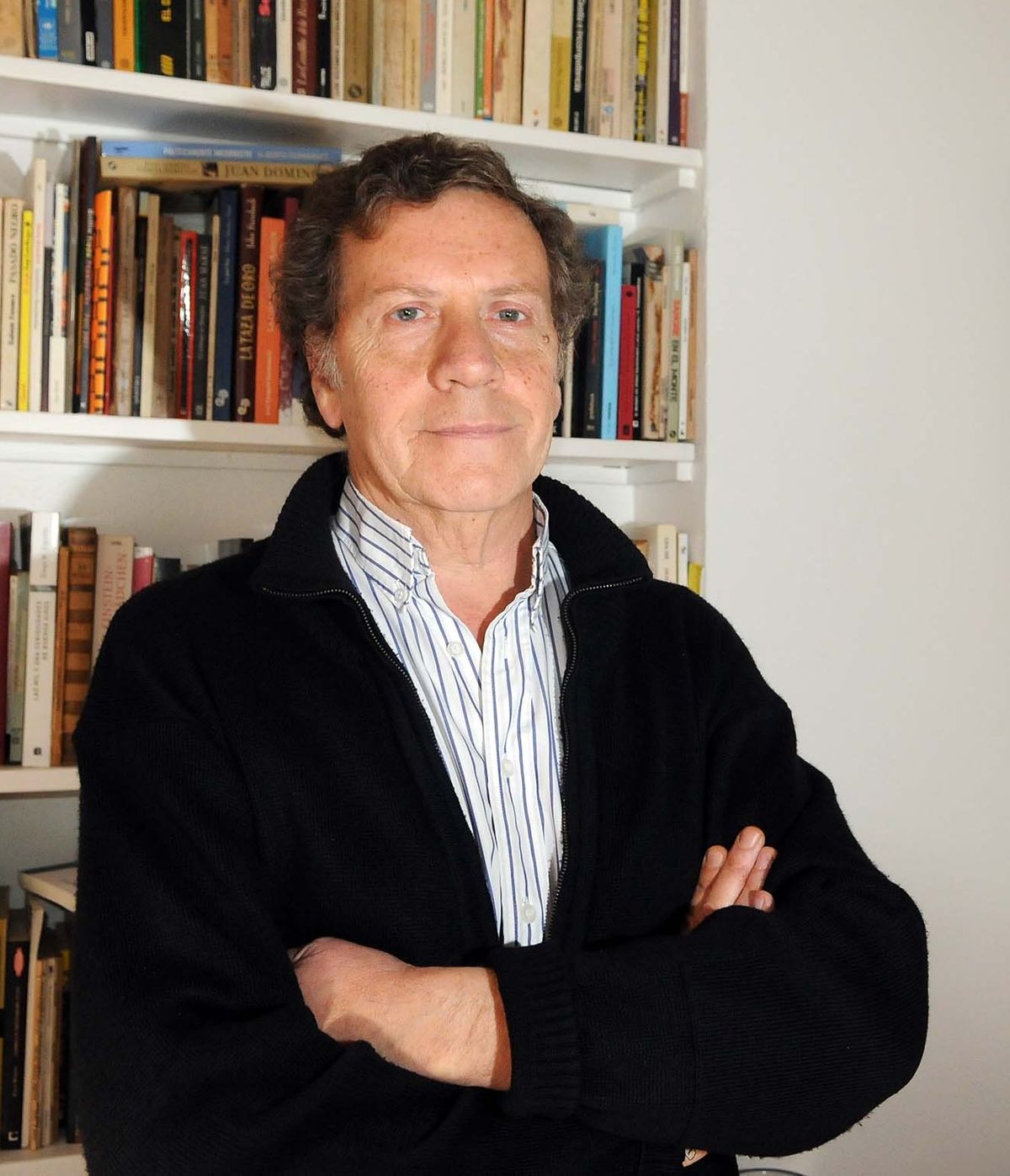 Eduardo Sguilia
Eduardo Sguilia
There were a couple times when I thought the translation clanged; don’t know why, but it did not sound quite right.
I also have a book about Fordlandia by a historian to read. Since it was published later I read the novel first.
Fordlandia: The Rise and Fall of Henry Ford’s Forgotten Jungle City (2009) by Greg Grandin
A wide-ranging and informative account of Fordlandia by an historian. There is much about Ford the man and Ford the company at the outset that was new to me but not altogether necessary to the story of Fordlandia, leaving me with the feeling that everything the author found was forced into the book relevant or not. For a book about the Jungle City more than half of it is about Dearborn Michigan.

That Ford came to replicate Dearborn in the Amazon may be true but we did not need quite so much background for that point to be made.
Ford’s proselytising efforts to mould new industrial men, my phrase, in his workforce is interesting. Like other paternalistic employers, Ford thought that if he paid well and supported clean living, the men will be responsible employees and that is that. Fordlandia became a laboratory test of that proposition on a green fields site far away from the temptations of Detroit.
The size of Ford’s industrial empire was enormous in the 1920s. Seventy-five thousand employees in Michigan and a like number elsewhere.
Ford had long believed in vertical integration. Growing its own rubber fit with that approach.
Settling on the Amazon was fraught for many reasons. There was much corruption in doing the deal, though Ford did not know it. There was much incompetence in the management and constant blame shifty and backbiting among the managers. Ford did know some of that.
To compress a longer story. None of the managers sent there knew anything about the tropics, the local people, or rubber trees.
Instead they were enjoined to replicate Dearborn there. To wit the buildings were planned in Dearborn for Michigan conditions and built there. These building were all wrong for the climate and terrain but it had to be that way for the press photographs.
When the rubber market changed, Ford pressed on in part simply to show that with enough effort it could be done. Climate, jungle, tropical pests, Brazilians, they would all yield to the genius of science, engineering, rationality, and logic. And money.
The original contract that ceded the land called for planting of a thousand trees by the end of the second year. To meet that deadline planting started in the wet season when it should have started in the dry season. Most of the plants were washed away even as they were planted. Those who managed knew nothing about wet and dry seasons in the Amazon jungle. But they had a can-do attitude learned in Dearborn and they set about replicating Dearborn in the jungle with brick houses and metal roofs that made them sweat boxes. But such will power cannot overturn nature.
The jungle prevailed. While the Brazilian rubber trees seeded in South East Asia flourished because they had no natural predators, in the Amazon there were many fungi and insects that feed on the rubber tree. When planted close together in a plantation, the rubber trees perished easily and readily. The Ford company took no advice from botanists, though some did try to tell it.
 What remains.
What remains.
There are many similar stories where the assumption was that if enough money was spent, enough equipment deployed, enough men employed, then it could be done. But there was never enough to overcome the Amazon. Think Fitzcarraldo.
With age Henry Ford became more and more stubborn and less and less reasonable. What started out as good intentions in paternalism became despotic.
There was also a good deal of mission creep. The stated goal changed and changed again to avoid admitting defeat. First it was to grow rubber. Then it was to develop the Amazon interior as a philanthropic gesture. Then it was to support the Brazilian government through investment. Next it was to export the American model of community. Finally it was to hang on to American interest in Brazil to keep it on the Allies’ side in World War II.
 Ruins.
Ruins.
I learned a lot from the book but I found the author’s didactic tone irksome. Rather it than informing the reader and then letting the reader decide, the moral is asserted early and often. Because of all the extraneous material as mentioned at the outset, I found the book hard to follow, though I already knew some of the story. Reading all this detail, makes me appreciate the way the novelist distilled enough for the story he told out of the morass of facts.
The obvious comparison, not made by the author, is with the building of Brasilia a generation. Although Brasilia was not built in the Amazon jungle but on a high, arid plateau in the middle of nowhere.
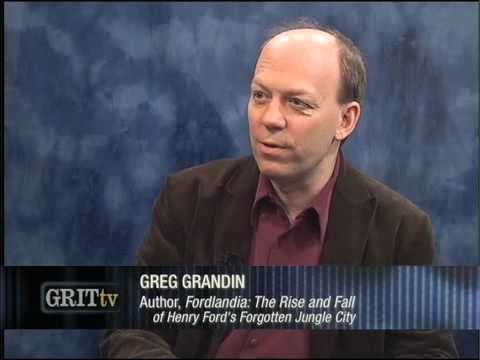
I found nothing that relates to utopian theory or practice.
‘A Climate of Fear’ (2016) by Fred Vargas
This is the ninth title in the tales of Commissar Adamsberg, the vague, unkempt, inquisitive detective, played in a film adaptation superbly by Juan Garcia.
 Juan Garcia as Adamsberg.
Juan Garcia as Adamsberg.
There are also television episodes that have all-star guests like Charlotte Rampling. In the following picture from the television production we have Adamsberg, Danglard, and Retancourt.
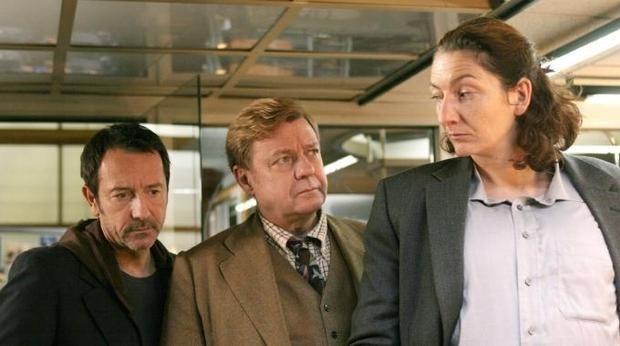
The characters are varied and amusing; the dialogue is human and humane; the situations stretch from the mundane to …. Iceland and back.
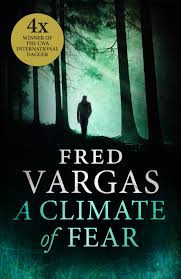
How does she do it, Fred Vargas, one time professor, now full time writer? Well, I hope she is at it full time because it is a big world and more of it needs Adamsberg, Danglard, and company to resolve its mysteries.
The setup in this title? An elderly woman is found dead in her bath with slashed wrists. She had terminal cancer and the gendarmes call it suicide, and following procedure they photograph the scene and present it to the station chief to sign off and close the file. Bored, he reads the file and looks at the pictures.
Odd that symbol drawn in lipstick on the side of basin.
He calls Danglard, Adamsberg’s number two, famed in the small world of plod for his vast knowledge, retentive memory, and capacity to solve puzzles. Danglard has to see it for himself in situ, and being bored, Adamsberg rides along with Danglard for an outing. The symbol baffles even Danglard and once baffled he cannot quit. Adamsberg is indifferent as they return to their desks.
Then, by chance, a woman comes to the front counter of the nick to make report, but she finds the cop shop all rather distressing and turns to leave, her mission unspoken, but Danglard passes through the lobby and he, of unfailing courtesy, addresses her with great civility. She responds to his politesse, and in short order she reports…. It ties in with the ostensible suicide.
Now Adamsberg reads the file and the plot thickens. Terminally ill or not, why would such a formidable woman lay down fully clothed, hair done, perfumed, nails polished in the tub full of water and cut her wrists? Why would a woman described as determined and self-sufficient, give way? Why is there no suicide note? Why did she struggle in her Zimmer Frame to mail a letter that afternoon?
It all does not add up to zero. There is something more to do it and it meets the eye in the symbol that even Danglard cannot decode.
As ever there are tensions among the officers, numbering about twenty, in this unit. Adamsberg’s loyal number two is Danglard, and there are others who also suspend disbelief in order to be loyal to him, too. It takes suspension because he does go off on tangents, and some do not work, but others do. The tangents come from his intuition which he seldom can explain. Adamsberg is not articulate or learned.
Against this are the positivists in the squad who want facts, finger prints, DNA samples, eye-witnesses before making a move. The metaphysical cloud shovelers who follow Adamsberg are tested in this title, and even Danglard wavers. That phrase ‘cloud shovelers’ was hung on Adamsberg and his deputy in Quebec in an earlier title, but it sticks.
Characterisations are one of Vargas’s strong points. She differentiates her characters and gives them each space, in the way Frank Capra gave character actors camera time, believing it enriches the story, rather than detracting from the protagonist. It sure does. (There days most of the diminishing breed of character actors could be, and sometimes are, replaced by CGI. [Computer Generated Images, Mortimer!])
In this tale there is a thuggish stable man with a police record, who dotes on his horses while imposing discipline on them with whistles and words of kindness that abash both Danglard and Adamsberg. There is a retired nurse who dithers, but is incisive when it counts. There is a spoiled and petulant young man of twenty who has depths none anticipated. Then there are the history re-enactors, some of whom are even odder than Adamsberg.
Most of all there are the regulars, starting with Adamsberg wearing clothes that looked slept-in and probably were, again. Danglard who will never be promoted because he is an alcoholic, a single parent with a brood that takes up a lot of time and energy, and a walking encyclopaedia as far as colleagues can tell. There are many others on the team, like the Amazon Retancourt, who are all watched over the in the office from atop the photocopier by Snowball who figured decisively in one of the earlier tales.
In this title the plot is, as always, complicated, convoluted, and obscure. Yet when it is nailed, it all hangs together. Of course, it is far fetched and some of the touches of the bizarre are, well, bizarre, and probably unnecessary but they have become the decoration on Vargas stories. The bizarre touches, the boar, the mysterious island, are well judged, if distractions.
 Fred Vargas
Fred Vargas
Frédérique Audoin-Rouzeau (1957-), archaeologist by day and krimiest by night. At the Centre National de la Recherche Scientifique and then the Institut Pasteur she specialises in epidemiology, particularly the Black Death in Europe. Her authoritative study is ‘Les chemins de la peste’ (2003). Some dinner table conversation there I expect.
‘An Invasive Species’ (2015) by J. J. Salkeld
A new locale, a new investigator, a new approach for this jaded reader of police procedurals.
The protagonist, Owen Irvine, was once in policing and then spent a decade investigating social benefits fraud for the local council in Cumbria.

His past in policing is murky, and no doubt more of his backstory will emerge. Ho, hum. Backstories do not a front story make.

Tracing penny-ante fraudsters is not much fun for Owen but there are challenges. Mostly though his prey are single mothers trying to squeeze a few more quid from the system for their kiddies, or so they say despite the new car in front, the satellite dish on the roof, and the ashtray full of St Tropez cigarette stubs on the table.
Owen is numb, having heard all the lamebrain excuses before, each told as if unique.
Not only does the council squeeze the pounds it pays to claimants, it also squeezes those it pays to the investigators, and the chopping block has Owen’s name on it. While his record is the best, it is too good, because he has banged up more than one relative of a councillor. In this and several other ways, the plot is leaden.
Then he meets one fraudulent claimant who is different. It is another woman, but one without excuses to offer, who seems educated, and smart, and who admits her crime, and yet …. she was desperate enough to pull a stupid stroke for a few hundred quid.
Owen breaks his own rule and asks why? He has never had to ask before. Always before he is told an avalanche of reasons he does not want to hear, because he is only serving the injunction, not making the decision. This one, Clare, tells him reluctantly a story about a man who deceived her, took advantage of her, and drained her bank account.
He passes the story onto a comrade in arms at his old nick, and, by the legerdemain of crime fiction another similar case arises, and the chase is on. Well sort of.
There a reality check in this book. Time is budgeted and for a crime without violence, for a crime where there is no evidence of a crime apart from the drained bank accounts, the time allocated is half a day. Imagine what a Star Trek film would be like if there were a Star Fleet budget. No more warp engines, Captain, we are out of dilithium crystals and do not have the gold-pressed latinum to pay for more until the end of the space-year.
Ah but the recently sacked Owen, who is more or less financially independent (because he owns his home, has a vegetable patch, a trout stream, an eternal Land Rover, and few needs), has plenty of experience in finding people who do not want to be found and time on his hands.
That is the set up. A pretty good one, if only it had been told with some élan or wit.
This reader felt the boxes being ticked. Perhaps that is inevitable in the first title of the series. Owen’s backstory is forced into the foreground. To do so makes it very wordy and slow. Though Owen is supposed to be laconic and reserved, but he talks about himself incessantly to get that backstory out. To enhance Owen he is made a victim in the dismissal by the council and by implication in his earlier dismissal from the plod. A poor put-upon hero, yet again, martyr to his virtue. All of this background interferes with any interest in the foreground. The time and place are described but they take a distant second place, and that is a shame, because the regional setting is what I found attractive at the outset.
Among the compensations are some lively scenes. The puzzling interview with Clare is one. Another is with a fraudster who seems to have done it just for fun and enjoys discussing it with Owen. Then there is the police officer who is uninterested in the information Owen passes on. They have a pissing contest, as they say on Channel 7Mate. Predictable but well done.
Regrettably, but perhaps inevitably in this kind of context, all the characters sound alike, use the same speech mannerisms, idioms, and vocabulary. All the police officers sound alike, even the educated Asian woman. Indeed, Clare is only distinctive voice in the early going, and that is a plot device, to be sure, and a good one, but it emphasises how monotonic the rest are, including Owen.
 J. J. Salkeld, a very industrious writer to judge from the array of titles on Amazon. Strength to his arm.
J. J. Salkeld, a very industrious writer to judge from the array of titles on Amazon. Strength to his arm.
It is the first in a lengthy series and perhaps things come together. Time will tell, if I get back to it. I found it easy to put aside.
‘Schrödinger’s Gat’ (2013) by Robert Kroese
A noir krimi with quantum physics!
I selected it for the Kindle because I smiled at the title on the cover. Wait! There is more. It is a krimi based on quantum physics. Yep! (It also represented light relief from reading Nietzsche.)
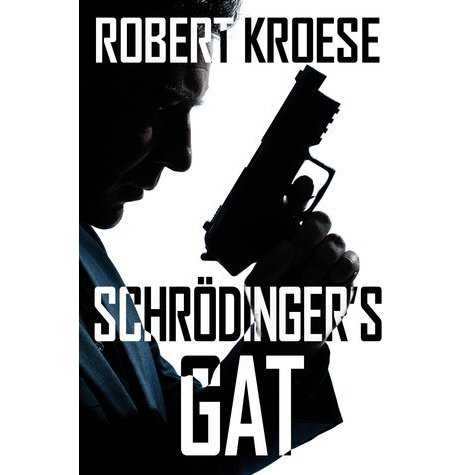
Huh?
That is how our protagonist reacts. ‘Huh?’ He is Paul, one very depressed loser in San Francisco whose path crosses that of Tali, who saves his life but she runs away when he tries to thank her.
A chartered loser, he is used to people avoiding him, but not quite like this. He pursues her, and, without breaking stride, she promises to explain all, but first he has to grasp some quantum physics.
Huh? Well, all right.
But before she can explain much, she first has to do a few things, and, well, seeing is believing, and Paul sees enough to … believe, a little. She arranges to met him for a further explanation but she is a no-show.
Huh? (Paul has a small vocabulary.)
What is a fellow to do but Google it; he reads up on quantum physics, advising readers in direct address to skip that part of the book. I should have, but I didn’t. Had I, that would have been in total about three-quarters of the book. Of course the cat comes up.

During this ersatz research he comes across the name of a Stanford scientist, the summaries of whose work on websites sound like Tali’s interrupted exposition. While the scientist seemed to have had a fine career strewn with publications and accolades until a few years ago when he, too, seems to have disappeared. Huh. (See!)
But even a loser can use the telephone book and Paul finds a street address that might be that of the professor. Hey, presto!
Well, that’s a lead. What would Philip Marlow do? Doh! He would go see the professor.
It is a mile-a-minute, except for the asides on matters quantum physics, and is it droll. dry as dust. Regrettably the asides on QP increase, and go on and on. The mile-a-minute stretch like a Salvador Dali watch.
Oh, and the cat. Did I mention the cat? Well, there is neither a cat nor a gat. Which word I always assumed was derived from Gattling gun, the rapid fire weapon developed in the Nineteenth Century, precursor to the machine gun. Another weapon so deadly that its inventor thought it would end war.
The set-up sounds better than it reads. It takes a quarter of the book to get the characters lined up around all the lectures on QP. There is so much preliminary fussing that it reminded of those dreadful Sunday lunches where the fussing over nothing is continuous so that the food does not appear until 4 pm by which everyone has had too much alcohol and a headache either from the drink or lack of food.
Then Paul inadvertently, if you can believe it, drops a homemade bomb into the fountain at a shopping mall and it kills a great many people. The cops arrest him and in his cell he reads Kant on metaphysics and shares it with the reader. Which is harder to swallow the bomb at the mall or Kant in the clangour? What is worse is reading it.
By this stage three-quarters of book has elapsed without any further sighting of Tali, and no explanation of events that this reader can follow. Where is that damn gat? Where is Schrödinger? Or even the cat?

Eventually this mass murderer is sprung on bail. What! Fire that DA and get one keeps capital criminals in the slammer.
There is a final confrontation of sorts but mostly it is like one of those post-modern conference presentations where the words flow but the meaning does not. The characters talk each other to death, or something. Hard to tell through my glazed eyes. Since this is San Francisco there is an ever handy earthquake to settle matters.
There is a long afterword with more QP. Enough, already!
 Robert Kroese, who has many other titles on Amazon.
Robert Kroese, who has many other titles on Amazon.
Following the afterword is a biography in which we read that the author wrote his first novel in second grade. Is this it?
I did make it to the end, but only with quick thumb work flipping the pages with very little reading and less pleasure.
Filipe de Meneses, ‘Salazar: A political biography’ (2009)
The Salazar regime in Portugal was eternal and ephemeral. It was granite and then poof, it disappeared over night!
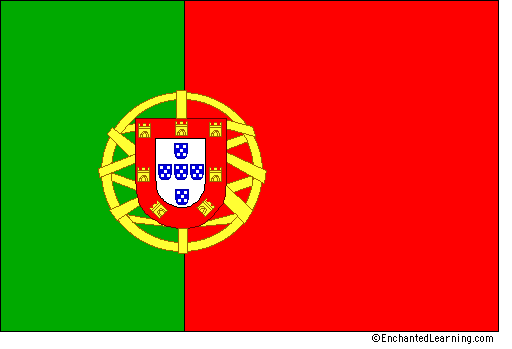
Salazar was one of the great dictators of the age of dictators and yet he was unlike any of the others of that ilk. Portugal was a fascist associate while a Western ally.
Salazar’s regime was authoritarian and yet tolerant in ways none of the other dictatorships were. Salazar’s regime looked backward and yet adapted to change. Salazar’s Portugal was a tiny country at the end of the line, more often forgotten than remembered, yet it coloured the world map with an empire that rivalled those of Great Britain and France in its extent and surpassed those of the Netherlands, Belgium and Italy in volume.
The paradoxes could be extended, but let that suffice to show what mysteries Portugal and Salazar offer.
First to some facts. António de Oliveira Salazar (1889-1970) dominated Portuguese political life from 1926 to 1968. The regime he created lasted until May 1974 when winds of change blew it down.
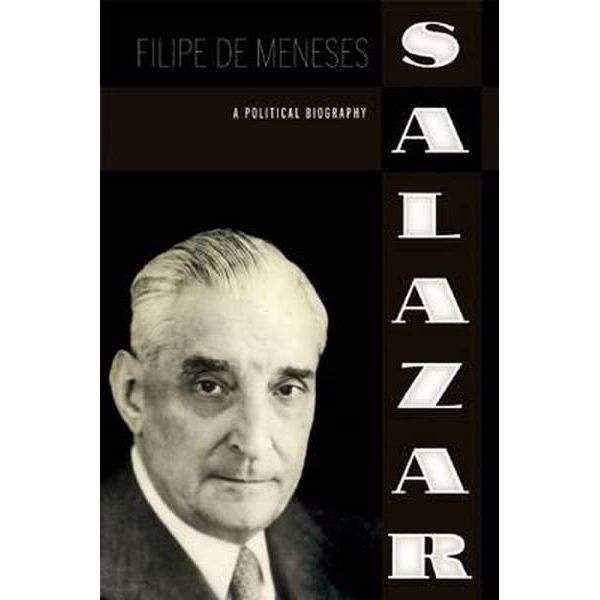
His singularity starts with his name. In the conventions of the Iberian peninsula children take the surnames of both the mother and father and in that order. In his case, they are reversed for his father was Oliveira and Salazar his mother. There is no explanation in these pages of this oddity.
He was born in a village to a modest but prosperous family, the fifth surviving child and the only boy, who was doted on by his four sisters and his parents. They educated the girls to read and write, and him, too.
In 1900 Portugal had a population of 5.5 million, comparable to the Netherlands, Sweden, and Canada at the time, while France, Britain, and Germany were 40 million or more.
In 1415 Ultramar Português became the first European empire to span the globe; it began with Ceuta (later ceded to Spain) in North Africa. In 2017 the territories that were once part of the Empire lie in sixty different sovereign states! (Well, so says our author but I could not verify that figure by examining entries in Wikipedia.) Vast and diverse.
Of course not only had Ceuta been lost by Salazar’s day, but also Ceylon and Brazil. Gone these lands were, but not forgotten, especially the latter.
The geographic imperative had at times pushed Portugal into the arms of Spain and at other times the impulse for independence drove it away from Spain. The rivalry had something of that of a little brother and a big brother, with the difference that the identity of each changed. Sometimes Portugal was the big brother, and at other time the little brother as the fortunes of the two countries waned and waxed in changing circumstances.
In facing the Atlantic Ocean, Portugal has long been a major trading partner with the dominant sea-power of those northern waters, England. In 1373 it entered into a treaty of perpetual friendship with King Edward III of England, signed by Queen Eleanor of Portugal, and that treaty played a part in Salazar’s life and times and remains extant to this day, and is sometimes referred to as the Port Treaty, not short for Portugal but to refer to the beverage port, which derives its name from Oporto from which much of it has long been shipped.
Back to Salazar, as a boy he was precocious and shone in his early school work and did well in national examinations. The only way to continue his education was through a seminary and off he went. The default assumption was that a boy in a seminary would continue in the church. He did not.
His devotion to the Roman Catholic god was complete and, it seems, never questioned, but the wider world called to him, and again through national examinations he won a place at the historic Coimbra University, established in 1290. It was the only university in Portugal at the time with but five hundred students, all men. Admission was entry into the elite of the small country and its vast empire and the Portuguese-speaking world beyond the empire. Among his classmates were individuals with whom he would work for the rest of his life, and some enemies, too, in the small world of Portugal.
He is routinely ranked with the dictators of the day, Hitler, Mussolini, Stalin, and Franco and their many lesser imitators in eastern and central Europe, like Dollfuss in Austria, Antonesçu in Romania, Horthy in Hungary, and Metaxas in Greece. Yet Salazar stands apart from these others in two simple but important ways.
He was not a military man in any sense. Try though one might, not a single picture can be found across the internet of Salazar in a uniform. None. He did not do military service as a youth, because he was a seminarian and then a university student. Nor was he ever interested in armies, weapons, uniforms, or that which comes in their train. The military played a major role in his career but he was never part of it and always distrusted it, and put considerable effort into reducing its size and influence.
There is a second way in which he differs from this club of thugs. He spiritual commitments were palpable and sincere. Because of that religious core, he followed Christian teachings, so that he never used, abused, and discarded Portuguese on the industrial scale that the others did. Later, yes, in time there were Secret Police (Polícia Internacional e de Defesa do Estado), prisons, and censorship, but not at the outset and never on the same scale as thugs in the club.
Salazar made his regime, not with clubs and guns as Hitler, Mussolini, Stalin, and Franco did, but with paper. His political power grew out of the barrel of pen.
Footnote. Portugal had remained neutral at the outset of World War I. The British invoked the time-honoured treaty to protect Portuguese colonies in Africa, and there were armed clashes with German forces in Angola and Mozambique. In addition, submarine warfare off its coast alienated public opinion, especially those who traveled and shipped by sea. In 1916 the Portuguese seized German ships in port as reparations for Portuguese ships sunk by U-Boats and Germany declared war on it. About 50,000 Portuguese served on the Western Front. This force was pulverised in one day of battle with 8,000 dead and 12,000 casualties. A few thousand went to Africa where many died from disease.
There was starvation and death because of the blockade of submarine warfare, and the Spanish Flu afterwards killing thousands more. Though far from the battlefields, Portugal suffered greatly during this war, which left lasting scars which Salazar faced in his early days.
Salazar’s career began in the 1920s when a military government in extreme desperation made this professor minister of finance and he performed miracles in balancing the budget. The army made him and for years army officers toyed with unmaking him.
The military government was anti-monarchist and republican with some liberal elements that wanted to modernise Portugal.
Salazar quickly proved himself invaluable to the generals, much as they despised him. The details are well told.
Salazar at first tried to integrate Portugal into the world economy after World War I, and succeeded in balancing the budget, but he was struck by the railway car of the Great Depression. No sooner did he payoff all of Portugal’s debts and go back on the gold standard than the bottom fell out of the world economy.
Salazar in reaction turned inward to make Portugal an autarky. (Look it up, Mortimer.)
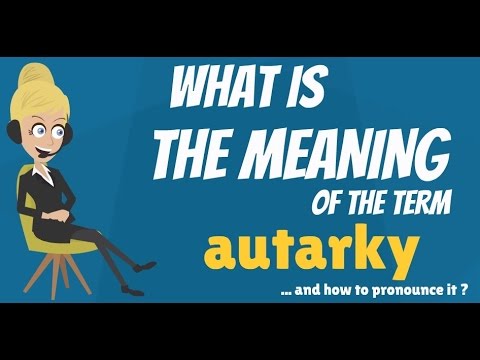
Doing that met severe restrictions on consumption and production and these were policed. Right down to the calories. Sumptuary laws, though not called that, also reined in the consumption of the wealthy. All of these was clothed in Biblical rhetoric. While he believed in education, trains, hospitals these could only be built within a balanced budget. Better to do without them, than go into debt because in the aftermath of World War I he had seen the truth that ‘debt kills.’ (A phrase Bob Dole used at times to explain his own approach to public policy.)
At the outset Salazar took the time and made the effort to educate the newspaper-reading public in the realities of national finance, and he created a statistics office for that purpose. The constant demands for explanations, and the endless special pleading over the decades eroded his good will and by the mid-1930s he slowly turned down the authoritarian road. Gradually he replaced the military officers in government with civilians. In time he managed to assign troublesome critics to posts in distant colonies.
The biography shows this gradual shift into the authoritarian gear, slowly and surely, with some stops and starts. But always heading in that direction. He was never a democrat but he was tolerant of differences, and sometimes changed his mind.
Salazar rehearsed all the criticisms of parliamentary democracy that authoritarians and the contemporary media dish up. With revisions to the constitution, more and more authority was concentrated in his office. This process was made possible by the unflinching support he enjoyed from General António Óscar Fragoso Carmona (1869-1951), who was the president (1926-1951) and the de facto commander-in-chief of the army, against many officers who wanted to see the end of Salazar. They did not like living with the means of the country either.
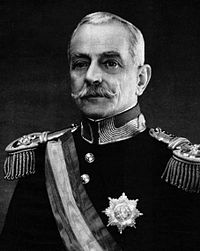 Carmona
Carmona
There is little in the book about how and why this odd couple collaborated. Carmona was a soldier’s soldier but he was a free mason and a republican, while Salazar was a devout Catholic and a traditionalist, though he judged it was impossible to return to the monarchy, he did want a government above the fray, not one subject to the whim of an electorate. In early days Salazar was careful to defer to the formal authority of President Carmona. At other times, he feigned illness to show the President just how invaluable he was, and at times threatened to resign unless his wishes were realised.
In Salazar’s Portugal everything was regulated and controlled in order to live within its means and to maintain social order. To open a coffee shop, one needed permission and if there was a coffee shop nearby, permission would be denied. Put those resources to another, more productive use. There was no free market. Likewise labor became controlled with only a few government-approved unions. Slowly but surely Portugal became the so-called Estado Novo.
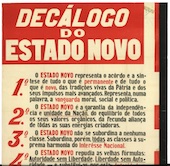
Part of the Estado Novo was a revived patriotism. Because most of Portugal’s recent history had been conflict, Salazar renewed interested in the heroic past of the late medieval and early renaissance periods when Portugal was a world leader in learning, in christian piety, in navigation, in the arts and architecture. He poured money into identifying, preserving, explaining, and opening up this past for the contemporary world. Buildings and books from this era survive today because of this investment.
Salazar did not delegate easily and for years nearly everything from permission to open a cafe to army promotions went over his desk. He publicly acknowledged this concentration to explain the slow pace of activities. He was not a workaholic and seems never to have been in a hurry, always on Portuguese time.
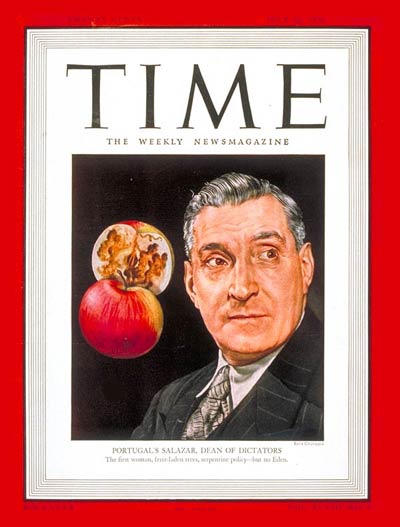 July 1946.
July 1946.
Salazar had no interest in Portugal’s empire but it remained, and threats to it from other colonists were a constant worry to some as were threats from within it, especially the resource-rich Angola, which might secede. The historic significance of the empire was too important to ignore and in time it entered into his calculations, mostly as a source of revenue or resources. Colonies that offered neither were neglected, e.g. Goa, Timor, and Macau in Asia.
Nor was Salazar much interested in the economic development of the colonies because he supposed, rightly, that the Portuguese settler population there was not loyal to Lisbon but more inclined to pursue their own interest, even to the point of going over to the British or French. While he did not value the colonies, he could not be seen as the one who lost them as they were part of the distinctive national patrimony. Many a political leader has been over this barrel.
In time Salazar subscribed to Lusotropicalism. Huh? It was a doctrine first developed by a Brazilian sociologist and one which Salazar gradually adopted more and more explicitly. Portugal was a multi-racial, pan cultural, and plural continental agglomeration of peoples. In this combination of attributes Portugal was unique. It recognised the reality that Portugal needed the colonies (for resources and prestige) more than some of them, like Angola, needed Portugal.
The term ‘Luso’ comes from the Roman name for what is now southern Portugal, Lusitania. (Yes, like the famous ship.) There is a Lusophone association today comparable to the Francophone Union.
While its longstanding treaty with England was honoured, Portugal remained neutral in World War II but with great difficulty and much manoeuvring. The Japanese encircled and starved Macau but did not set foot on it. The Dutch and Australian armies landed in Dili (Portuguese East Timor) in violation of this neutrality, and when the Japanese retaliated by entering East Timor, Lisbon made a symbolic protest but did not join the Allies and allowed the Japanese legation to stay in Lisbon. The Azores, Madeira, and Cape Verde Islands were of great strategic value during the Battle of the Atlantic, like Iceland, and the British convinced Salazar to allow a base in the Azores in early 1943 but only after long, detailed, and laborious negotiations. Portugal did not participate in any aspect of this base. All the materials and labor was supplied by Britain. While this was a lost business opportunity for cash-strapped Portugal, it allowed Salazar to say to Franco and through him to Hitler that Portugal was not a party to this base but only a reluctant landlord who received no rent.
Part of the agreement with Great Britain permitted Portugal to continue to export tungsten (sometimes called wolfram) to Germany. With the income from these sales, it paid for imported food from Brazil transported on British ships. The tungsten trade is the nexus of ‘A Small Death in Lisbon,’ reviewed elsewhere on this blog.
Antony Eden credited Salazar with restraining Franco’s Spain from a more active association with Nazi Germany. Certainly relations with Spain occupied Salazar morning, noon, and night for more than a decade. While Spain had little to contribute to the German war effort it did have one strategic asset of global significance that the Germans did want — Gibraltar.
 The Rock
The Rock
It is easy to imagine that Franco with German encouragement and assistance might have besieged or even seized Gibraltar, and that would have all but closed the western Mediterranean to British shipping, and that would have been a strategic blow of monumental proportions. Without naval supplies Malta would have succumbed, freeing the Mediterranean of RAF control. Then the Afrika Corps of Erwin Rommel might have prevailed in North Africa cutting the Suez Canal and threatening, if not reaching, the oil fields of Middle East, or outflanking Russia in the Caucuses. The German General Staff had developed a plan to assault Gibraltar but the logistics to support it were impossible without the active assistance of Franco’s Spain and probably also Vichy France, both of which were neutral.
While Salazar’s government was and became increasingly authoritarian, it did not come to power, he did not come to power by violence as did Hitler, Mussolini, and Franco and the regimes they created. Nor was violence a direct instrument of government in Salazar’s Portugal. There were no purges. No systematic attacks on parts of the population, Jews, unionists, free masons, homosexuals, or others. Murder was not a policy. Even those who tried to assassinate Salazar suffered exile, not torture and murder.
There was also no general social mobilisation. Yes, Salazar repeatedly called on Portuguese to make sacrifices for the nation, but there were no rallies to create a nation figuratively, if not literally, at arms. Parades there were on patriotic anniversaries and religious festivals, but no Nuremberg rallies, no harangues from Roman balconies, no colossal vanity projects built by the slave labor of political prisoners as occurred in German, Italy, and Spain.
There was no ideology pervading the army, the bureaucracy, the police as there was in the other three. There were no Thought Police. The only test for a place in any public institution was technical competence not ideological adherence. While the communist party was outlawed, there was no systematic or sustained search to ferret out its members and sympathisers. If they kept their heads down, then that was enough.
Nor did Salazar strut like a Mussolini, suck the blood of the crowd like Hitler, nor pass death sentences with a yawn like Franco.
Likewise he had no interest in the army, which had overthrown the monarchy in the name of liberalism, and tried, as his authority increased, to circumscribe it. He seems in part to have been trapped by his own imagery of the householder who must husband resources, and he could see little use of weapons and soldiers, and so declined to spend escudos on them.

Instead he relied to England on one side and Spain on the other to secure Portugal. A risky balancing act, but far less expensive than trying to create a modern army, which realistically was never going to be able to defend the country from either Spain or England any way, and easier to control. He seldom visited army barracks, and when he did, he did not come bearing gifts. Two generations of underfunding of the army may explain why it was inept in the colonial wars.
He is never to be seen in a uniform, though some short-lived efforts were made to create organisations supporting the regime with armbands and the like, he took no interest in these and they passed. There was no Hitler Youth, no Roman Legion, no Blue Shirts, no Brown shirts, no Red shirts, no Black Shirts, no Falange, no Nazi Party. Nor were their pledges of personal loyalty to Salazar extorted from the populace.
Yet it is equally true that many suffered in his regime. There were all manner of exiles from the previous tumults, monarchists in Brazil, extreme rightists in France and later in Spain, leftists in Spain and then France, republicans in England, liberals in France, adventurers in Tangiers. His regime exiled many, by banning them from Portugal for sentences of two or more years, leaving them to go where they might. In time, concentration camps were built in Angola and then Cape Verde where political prisoners were interned in terrible conditions and more than half died of disease.
And yet, when relatives of political prisoners in Cape Verde or Angola wrote petitions to him, he read them. When relatives asked for a personal audience to plead the case for a political prisoner, sometimes he acceded and heard them out. He seldom if ever changed his mind but he read the letters, and he did listen. Little as it may seem, it is inconceivable that Hitler, Mussolini, or Franco would do even that. There are many other instances of his forbearance in other contexts, too.
During the Cold War the PIDE grew and justified its existence by finding red plotters under many beds after kicking them over.
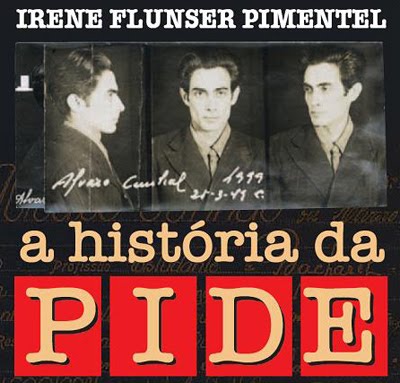
Arrests without writs or trials, and torture occurred, along with the murder of opponents of the regime. Salazar may not have known the details but nonetheless he created the system that spawned these deeds, and he kept a blind eye turned. Salazar identified so completely with the regime that any opposition to one was a betrayal of the other and the repression grew, and as always there were willing hands to do so in PIDE. Amnesty International was born partly in response to Salazar’s Estado Novo in the 1960s.
While the corporate elements of the Estado Novo kept prices low, this simply created a black market, often operated across the Spanish border, in which some grew rich and others suffered. When the colonial wars came it was the same story. Those from well off families did not go Africa but others did.
In the 1960s sun-seeking tourists from Britain and Germany went to southern Portugal and their money helped fund the bloody colonial wars.
Candidates for the few elected offices who criticised the regime were hounded, and after they lost the election, they were punished. Opponents could not win because the ballot boxes were stuffed. There was nothing subtle about this procedure which the international media reported. Salazar had no personal involvement and in many cases may not have known it happened, and he even occasionally inquired but was always readily satisfied by a bland response from an authority down the line.
Salazar insisted on fighting the three African wars within a balanced budget which had become an article of faith with him. The result was a constantly ill-trained and under-equipped army in the field. There was virtually no medical service in the army, and the quiet brain drain that had been going on for a long time increased in pace. Disease maimed, injured, and killed far more Portuguese conscripts than bullets.
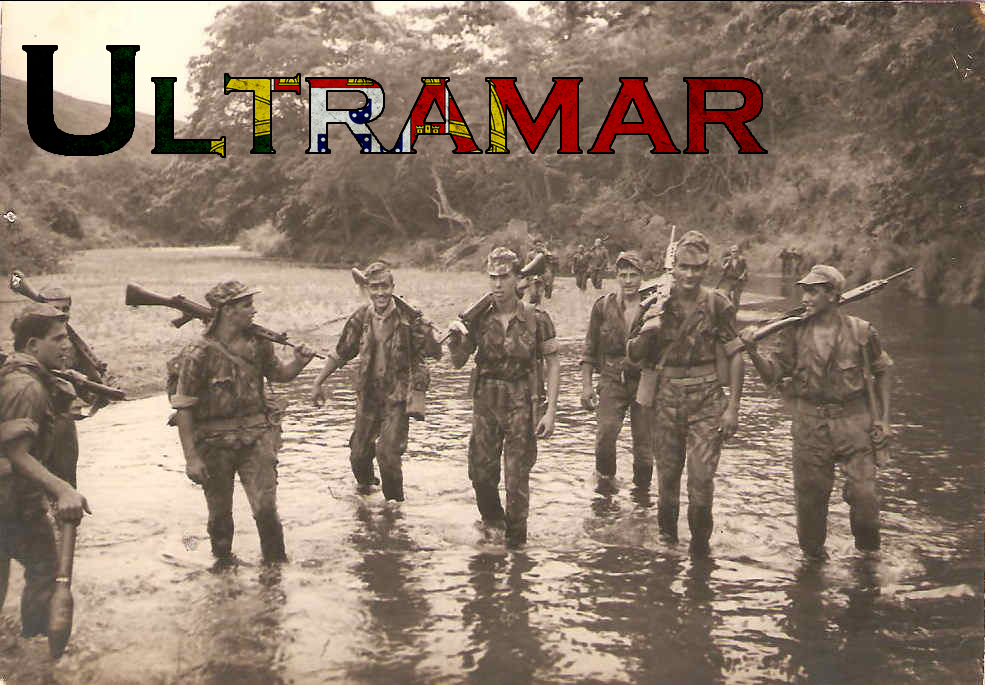 Portuguese conscripts in Africa.
Portuguese conscripts in Africa.
Politics made strange bedfellows. Portugal allied itself with Rhodesia and South Africa with Israel supplying many of the arms. Portugal desperately holding onto its empire allied itself with a break-away colony Rhodesia. Portugal that claimed no colour bar in its Lusotropical colonies allied itself with the apartheid South Africa. Portugal which was the origin of the Inquisition’s attack on Jewry relied on Israel.
Later there were all those Cubans. Cubans? Yes, Fidel Castro turned the Cuban army into mercenaries, 25,000 of them, and sent them off to Africa. The Soviets paid Cuba in oil extracted from Romania. Blood for oil.
Likewise Salazar’s determination, in a convoluted manner justified by Lusotropicalism, to swim against the tide of post-war decolonisation led to three wars in Africa, which Portugal could neither sustain nor terminate. It held grimly onto Macau and Timor while doing nothing to improve life in either. It held onto even more grimly Goa and the associated enclaves grandly called the Portuguese States of the Indes when India was born. In a round-about order, Salazar told the Portuguese governor of Goa to fight the Indian army to the last man, but this governor decided he did not receive this order and ignored it. When he returned to Portugal, there was an inquiry into Who Lost Goa, but nothing came of it and the one-time governor went into retirement to write his memoirs. Another example of Salazar’s forbearance.
The material benefits from the colonies, even Angola, the richest, were small against the costs of retention. Retention was about prestige, not money, and Portugal’s distinctive raison d’étre, Lusotropicalism.
In this context he also broke with the Catholic Church because priests, bishops, and cardinals decried the murderous brutality of the wars, particularly that in Mozambique. Salazar’s response was to blame the churchmen for interfering with secular matters. He would hear no more of it, and measures were taken to intimidate some churchmen, and that engaged Papal attention. The dogs in PIDE were off the leash. Again Salazar did not authorise the use of poison in water and poison gas, but those to whom he entrusted the war did, and when it was challenged, Salazar accepted their denials without question.
Though not a workaholic, his workload grew during the years of World War II when he was in effect Prime Minister, Minister for War, Minister for Finance, Minister for Industry, and Foreign Minister. He laboured into most nights writing out his directions, thoughts, questions, orders, reports and reading everything he could get his hands on about the war and international events in a corner office visible from the street. Passers-by knew O Chefe was on the job. After the war he did share out the work more to a cabinet, but fretted when others made decisions.
He was a micromanager and seldom delegated and never easily, and certainly not anything important, accordingly the log-jams occurred, because for a decade, before, during, and after World War II, everything was important. The book succeeds in showing how both Salazar and the Estado Novo he created changed over time from benign authority in the troubled times of the 1920s to a suffocating and malign authoritarianism with the reality of violence. While violence was not the means of ascent, it became the means of continuation for Salazar and the Estado Novo.
Salazar was Portugal for more than forty years and the regime he created lasted fifty years. In his later years in the later 1960s the Portugal he knew as a young man in the 1920s remained fresh in his mind, chaotic, destitute, a laughing-stock in Europe, divided, and against that his regime was orderly and disciplined. One observer said, there is no such thing as Salazarism, there is no ideology, no program, no narrative, no policy, just Salazar at his desk every day responding to what happens with his pen. His responses became less and less flexible, and more and more blanket.
Nor was there any succession plan, in contrast say to Franco in Spain whose rule gave way to the restored Monarchy. A few times in the 1960s confidants suggested a lighter workload for Salazar, which could be arranged by making him President, but he rejected these suggestions with increasing vehemence. Finally in 1968 he became infirm and went into a coma for weeks. In the confusion, his cabinet turned to Marcelo Caetano who inherited quite a witches’ brew. Caetano had long been a private critic of much of the regime, and had at times been side-lined because of it. He held on until April 1974. He did try to make changes but the the Old Guard was so well entrenched and so frightened of change, he could do little until the roof fell-in.
A word on the nomenclature. Portugal had a president of the state and a president of council of ministers. Two presidents. The state president was elected for seven year term, and through Salazar regime the electorate decreased as it was ever more tightly controlled to ensure that the right candidates prevailed. The state president designated the president of the council who then formed a government. The state president performed the ceremonial tasks, received the credentials of foreign diplomats, cut the ribbon on national days, shook hands with returning soldiers, escorted state visitors here and there. The president of council made the decisions.
The reality was that Salazar fixed the selection and election of a state president who would comply with him. The electorate was reduced step-by-step to those who held official positions, all of whom were appointed by the Estado Novo, i.e., Salazar.
Salazar was president of council who could have been dismissed at any time by the state president, and in effect he was when he went into a coma.
Most international media overcame these repetitive, odd, and confusing terminology by referring to Salazar as prime minister to the state president.
Salazar did regain consciousness and lived another year. No one had the courage to tell him he was no longer in charge. But there was no pretence that he still ruled.
Despite all his efforts he did not leave Portugal a better place. It remained primarily agricultural and its agriculture depend on animals and strong backs. Roads were primitive outside the cities. Telecommunications scare and unreliable. Education was abysmal, as was health care.
On European tables of comparison, Portugal was the Louisiana or Europe, last on the good things, e.g., longevity, health, and first on the bad, infant mortality, illiteracy. Even less had been done in the countries of the empire, which he held so dear, to improve the lives of the Lusotropicals. Salazar would never admit any of this, but it was apparent to some around him, like Caetano, and to the world media and diplomatic corps.
Though he never married there were a few women in his life; yet he nearly had no private life, nor any interests outside work. At the mass in Lisbon at his death, the government officials, members of the media local and international, and diplomats far outnumbered friends and family. In this latter group were his two surviving sisters, his loyal housekeeper, and two nieces.
In the last chapter the author suggests that Salazar had three abiding motivations. The first was that he was agent of providence who had to shepherd Portugal. In his earlier career this conviction had a religious dimension but this receded with time. Second was the belief that without him the delicate arrangements would collapse. Third that the empire was Portugal and it had to be held. He was certainly right about the second above. Without him the Estado Novo was hollow.
Personally he was frugal and his family — the four sisters — benefitted in no material way from his rule. When Caetano took over, Salazar was out of job, out of the official residence, and destitute. He had only the clothes on his back. The government had to make special provision to pay for his hospitalisation and subsequent care and residence. He was without an escudo to his name.
In a television program in 2007 seeking the Os Grandes Portugueses of all time, Salazar prevailed over Ferdinand Magellan, explorer; Vasco de Gama, sailor and innovator; Luis vaz de Camöes, poet credited with creating the Portuguese language; Henry the Navigator, unifying political leader; Antonio Egas Moniz, Nobel Prize winner in medicine; and José Saramogo, Nobel Prize winner in literature. If ‘greatest’ means doing what no one else did or is ever likely to do, then Salazar is the choice.
The introduction of the book, while well written and informative, bemoans the difficulties of the scholar in a self-indulgent way. What is said is true, ‘Amen to that, Brother,’ but the introduction is not the place for it. It aroused in my mind the difficulties of those scholars who do not have jobs at all, of those scholars who cannot follow their interests, those lacking connections and direction cannot get good work published, and all those other people whose lives are far harder than competing for research grants or waiting for a sabbatical.
*****
A Portuguese once told me about Portuguese world literature as we sat, bored stiff, at a conference presentation, no doubt one involving post-modernism. Yes, the entire world’s literature was available in Salazar’s Portugal. But it was cut down to Portuguese-size. ‘Huh,’ I said, always quick on the uptake.
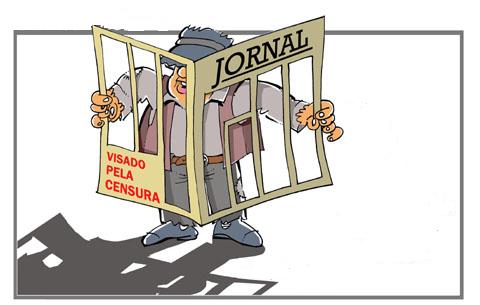 Perhaps reading Shakespeare was like reading this newspaper.
Perhaps reading Shakespeare was like reading this newspaper.
Censorship abridged, edited, and changed Shakespeare, Milton, Moliêre, Darwin, Rousseau, Göthe, Eliot to remove the big and the dangerous ideas of personal autonomy, political rights, regicide, consent of the government, self-expression, women’s capacities, dissent, immorality, growth through trial and error, divorce, protestantism, and so on. While Plato’s philosopher-kings remained in the Portuguese edition of ‘The Republic’ the community of wives, children, and property — communism — was excised, along with Plato’s repeated assertion that women must contribute to the society as do men. Also snipped out was the homosexuality, the marriage festivals, and the noble lie. I had asked about Portuguese translations of ‘The Republic’ and that question led to the conversation adumbrated above.
I have had an itch about Portugal ever since the Carnation Revolution of April 1974 which captured my attention in the early months of my first year in Australia, however that event was obliterated from the local media by the murder of five Australian journalists in East Timor after the Portuguese left and the Indonesians attempted to annex the area. These murders are re-visited every ten years of so by the Australian media. While what happened and who did remain unknown speculation recurs and recurs with attendant breast beating.
‘The Devil Girl from Mars’ (1954)
Inspired by ‘The Day the Earth Stood Still’ (1951) the prodigious Danziger Brothers — Harry and Edward — turned their hands and low budget to sci-fi in this effort. It offers inspired casting and a prescient screenplay, and we watched it the other night. Well I watched it twice. to get the subtlety.
Devil Girl, indeed. Patricia Laffan is THE movie. When she is on screen there is tension, there is presence, there is drama and when she is not, there is none of the above. On her more below.

In the remote Scots moors an odd assembly takes refuge in a lonely inn. A married couple run the place, baby sitting a grandson, with a handy man, elderly Jim, and girl of all work who is mainly seen at the bar. With the winter approaching the only guest is a beauty from the big smoke and then a scientist with a newsman in tow arrive to investigate the strange lights in the sky. An escaped convict also insinuates himself in the group. Otranto Inn is now ready for the night ahead.
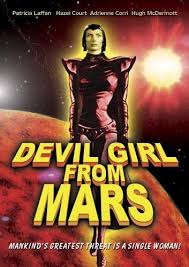
The scientist and newsman provide masculine leadership by debunking the worries of the women about those strange lights in the sky. ‘Just your imagination, my dear.’ They seem to have forgotten that those lights are why they are there in the first place. By now we know better. After the predicable confrontation with the convict, instant jealously over the beauty, and more condescension, Nyah appears!
Can that woman make an entrance. Seven times by my count. Shazam, indeed. The part of Nyah was made for Patricia Laffan, who is cool, calm, implacable, and pronounces her diabolical purpose with diction that would bring a smile to the twisted lips of Professor Henry Higgins. Her vowels are so round; her consonants are so icy.
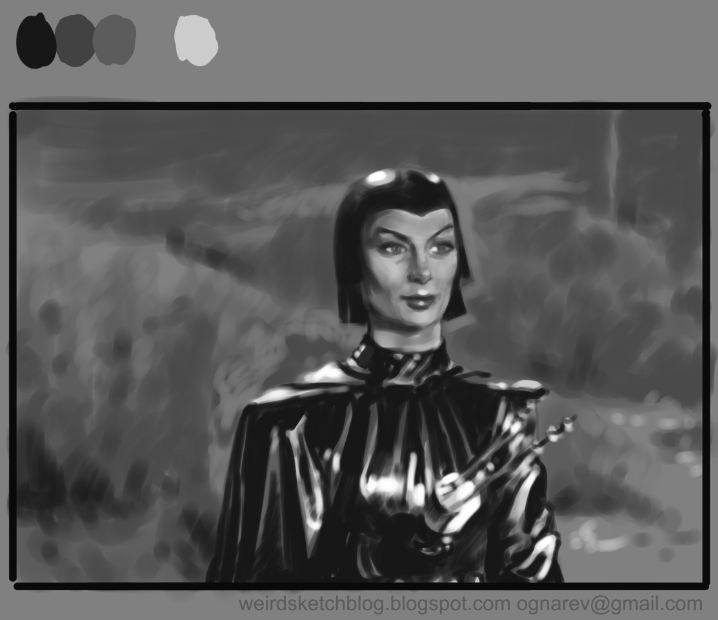
With a black leather body suit, a cat-like skull cap, a Darth Vadar cape, a mini-skirt avant le mot, and a ray gun, she has it all. Then there is the spaceship and within, Chani, the tin-man. (I thought she was calling him ‘Johnny’ which seemed awfully informal for Nyah, but on a long flight, well….)
Nyah has no time for small talk, nor, I suppose, for a shipboard romance with Chani; she is all business and the business is men!
The near-sighted, shuffling Jim with the feeble manner of an emeritus professor is a poor physical specimen, she declares. Poof! That’s it for Jim. He is no longer a drain on the taxpayer.
On Mars the emancipation of the women led to open warfare between the sexes. The females won, usurping the political power of the men. This eventually led to the sexual impotence of the planet’s entire male population. (Remember Louis Malle’s ‘Lune Noire?’ Look it up, Mortimer.)
She is Hillary Clinton! Come to emasculate the Republicans! ‘Go, girl’ we shouted from the couch! Grab ‘em by you-know-whats!
Just like the Republicans, the first reaction of the men is amused disbelief. What, after all, would a woman know!
After a few object lessons, the next reaction is brute force. Why negotiate when a good whack should fix things. Think of the 7MATE demographic. Efforts to beat sense into her backfire.
Stage direction. The telephone lines are down. The only automobile won’t start. Darkness falls. They are isolated and alone. They will have to work together to overcome this one woman who threatens life as men know it. Gasp!
But wait, what is the problem?
She wants men. Call for volunteers, Nyah! But stand back to avoid the rush!
The screenplay wobbles. At times she wants spirited and unwilling men and at other times the docile tweenager seems to be preferred. This Devil Girl has trouble making up her mind. How like a woman in the stereotype of the era.
The screenplay is inane and most of the acting, especially the male leads, ranges from wordy to wooden and back. The special effects are far from special, even by the standards of 1954. The tin-man clearly had no tin or much of anything else barely making it down the ramp much like the late Jim.
Lobby posters on the interweb give three women top billing. How rare is that! How rare was that in 1954.
Patricia Laffin, per the biography on the IMDB, was ‘a statuesque and striking actress with vaguely reptilian aspects, at once sinister and alluring; a smile that was as much a sneer and a commanding, imperious presence suggesting innate superiority with a delivery that was at once sardonic and disdainful.’
Stop there. That is Nyah.
Nyah is precise, frigid, fiery, and languid. This woman could be hot and cold simultaneously.
Laffan did not fit the pigeon holes of the time and was relegated to supporting roles as a villain or an eccentric. Our loss. (But she stole the show from Peter Ustinov in ‘Quo Vadis’ (1951) before hitting warp speed as Nyah.)
The men had their turn in ‘Mars Needs Women’ (1967), but Tommy Kirk in a wet suit one size to large for him just does not have what Nyah had! He did call for volunteers and not even Annette came. Mickey Mouse, indeed.

Both can be found on You Tube.
Is a picture worth one thousand words?
The cliché is that a picture is worth a thousand words. Not so.
Here is a picture that has been often seen. For those born yesterday, it is Vice-President Lyndon Johnson taking the oath of office for president in November 1963.
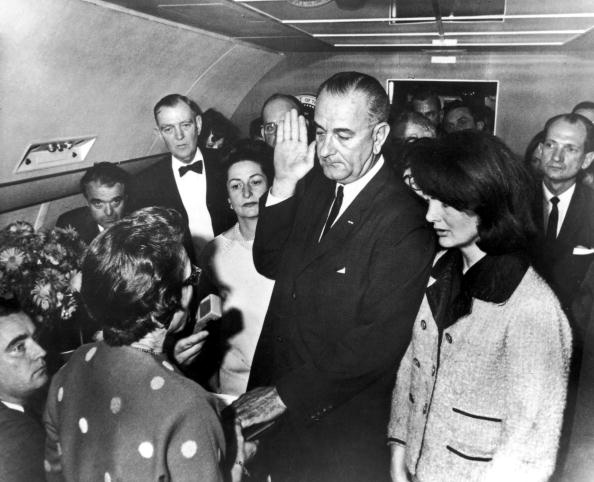
Class. write down everything you know about the scene.
Did you know this?
At President Kennedy’s death in Highland Park Hospital, Johnson had been told by the Attorney-General’s office to take the oath of office immediately. This counsel was affirmed vigorously by the military advisors who travelled with the deceased president. Why? Why no respectful period of mourning?
In that uncertain time in the Cold War nuclear age, the fear was that a hot head somewhere might take precipitous and irreversible action. Remember ‘Dr Strangelove!’ One prophylactic was an immediate and seamless transfer of power to new hands.
It was also stressed by all concerned that the new president should get to Washington D.C. as soon as possible to take up the reins and calm public fears.
The Secret Service also wanted to insure the security and safety of the new president, in case there was more to come. The times they were indeed uncertain and foreboding.
Ergo the ragtag group around the Vice-President set off for Air Force One to fly to Andrews Airforce Base. A ragtag assembly, yes, it was; but all the same some thought did into its composition even in those dark and dreadful hours.
Before leaving the hospital Johnson, with the presence of mind he often had, asked for a judge to join the group on Air Force One to administer the oath of office. He also insured press photographers were on board to document and broadcast the moment.
And not just any judge.
He asked for a judge by name: Sarah T. Hughes. She is the woman with her back to the camera.
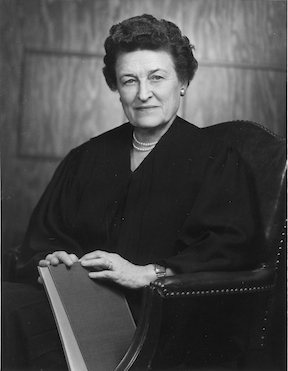 Judge Hughes
Judge Hughes
Johnson had nominated her twice for more senior federal judicial appointments, and each time it was blocked, because she was woman, because she was too old, because Johnson had nominated her was enough for Attorney-General Robert Kennedy to oppose her promotion.
In a kind of overdue compensation, Johnson bestowed upon her the historic role of swearing in the president there on Air Force One. But wait, there is more.
It also showed that same Attorney-General who was now in charge.
For the same purpose — demonstrating the smooth and immediate transfer of power — to calm the US populace and show the Soviets that it was business as usual, he asked Mrs. Kennedy to stand with him in the bloodstained clothes she wore. The torch was passed.
The picture alone tells us none of this. So much for the lie that a picture is worth a thousand words. This one alone is not even worth the four hundred words it takes to explain it.
When I upset a bookshelf groping for a power point a volume of Robert Caro’s magisterial biography of LBJ fell to the floor and in restoring it to the shelf, I noticed this picture.
